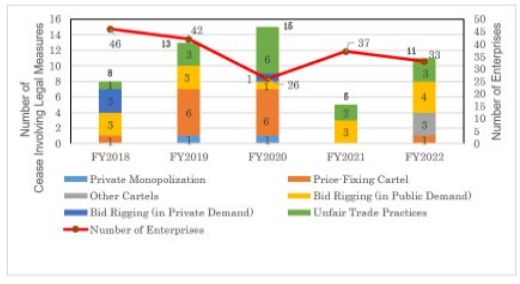1. The JFTC's Public Announcement of "Processing Status of Cases in Violation of the Antimonopoly Act in FY2022"
Yoshiharu Usuki / Hiroki Kitada
On June 1, 2023, the Japan Fair Trade Commission (the "JFTC") published "Processing Status of Cases in Violation of the AMA in FY2022" 1 . As the impact of COVID-19 pandemic subsided, the number of legal actions increased significantly, and the total amount of surcharges increased significantly to a record high of ¥101.9 billion ($890.9 million). The most notable features of the report are the investigation of bid-rigging cases in the electric power company and event sectors, and the first public announcement of a case using the surcharge reduction system. Below, we would like to briefly comment on the status of the JFTC's handling of the announced antitrust cases. As the impact of COVID-19 pandemic subsided, the number of cases involving legal measures have increased significantly, and the total amount of surcharges has increased significantly to a record high of JPY 101.99 billion (approximately USD 731.76 million) in FY2022. The most notable features of the report are the investigation of bid-rigging cases in the electric power company and event sectors, and the first public announcement of a case using the surcharge reduction system. In the following section, we would like to comment briefly about the processing status of cases in violation of the AMA published by the JFTC.
1.1 Trends in Cease and Desist Orders
In FY2022, a total of 11 legal measures (Note 3) were taken, including a total of 8 cease and desist orders (1 price-fixing cartel, 3 other types of cartels (Note 1), 4 bid rigging (in public demand) cases and 0 bid rigging case (in private demand)), and 3 commitment plan approvals (Note 2) concerning unfair trade practices. This is a significant increase from the FY2021 total of 5 cases.

(Source: The JFTC "Processing Status of Cases in Violation of the AMA in FY2022" (June 1, 2023) p. 2)
(Note 1) Other cartels are cartels involving quantity, sales channels, prohibitions on customer movement, facility restrictions, etc.
(Note 2) An approval of the commitment plan is an administrative disposition under the AMA, in which the JFTC approves a commitment plan submitted by a business operator that has received the Notice of Commitment Procedures. The JFTC is to render a decision to rescind the approval and resume the investigation procedure conducted before the Notice of Commitment Procedures is issued, for instance, if the JFTC recognizes that the commitment plan is not being conducted according to the approved commitment plan
(Note 3) Legal measures refer to cease and desist orders, surcharge payment orders and approvals of the commitment plans. The case in which both a cease and desist order and a surcharge payment order are issued is counted as one legal measure.
(Note 4) The cases which fall into both private monopolization and unfair trade practice are categorized as "Private monopolization".
The reason why the number of cases involving legal measures have increased significantly in FY2022 as mentioned above, is that restrictions on economic activities and investigation activities due to COVID-19 has been limited.
Among the legal measures taken in FY2022, it is noteworthy that strict measures were taken against other large-scale cartel cases and bid rigging cases ("The JFTC Issued Cease and Desist Orders and Surcharge Payment Orders against the Former General Electricity Utilities, etc." dated March 30, 2023), ("The JFTC's criminal accusation on bid-rigging concerning the outsourcing contracts of planning test events, etc. regarding the Olympic and Paralympic Games Tokyo 2020 ordered by the Tokyo Organizing Committee of the Olympic and Paralympic Games" dated February 28, 2023). With respect to the former case, the JFTC ordered related business operators to pay surcharge totaling approximately JPY 101 billion, and as a result, the total amount of surcharges in FY2022 reached a record high.
Other notable point includes the response to acts that unfairly disadvantage small and mediumsized business operators ("Report from SEVEN-ELEVEN JAPAN ceasing Product Guide Production Fee in PB manufacturing contract" dated December 22, 2022). In addition, although the case was not made public, the JFTC has issued a warning to a business operator that notified its outsourced illustrator that if it does not convert to a taxable business operator and instead selects a tax-exempt business operator after the introduction of the invoice system, an amount equivalent to 10%, which is the consumption tax rate, will be deducted from the transaction value.
To view the full article click here
Footnote
1. https://www.jftc.go.jp/houdou/pressrelease/2023/jun/230601_kanki.html
The content of this article is intended to provide a general guide to the subject matter. Specialist advice should be sought about your specific circumstances.


